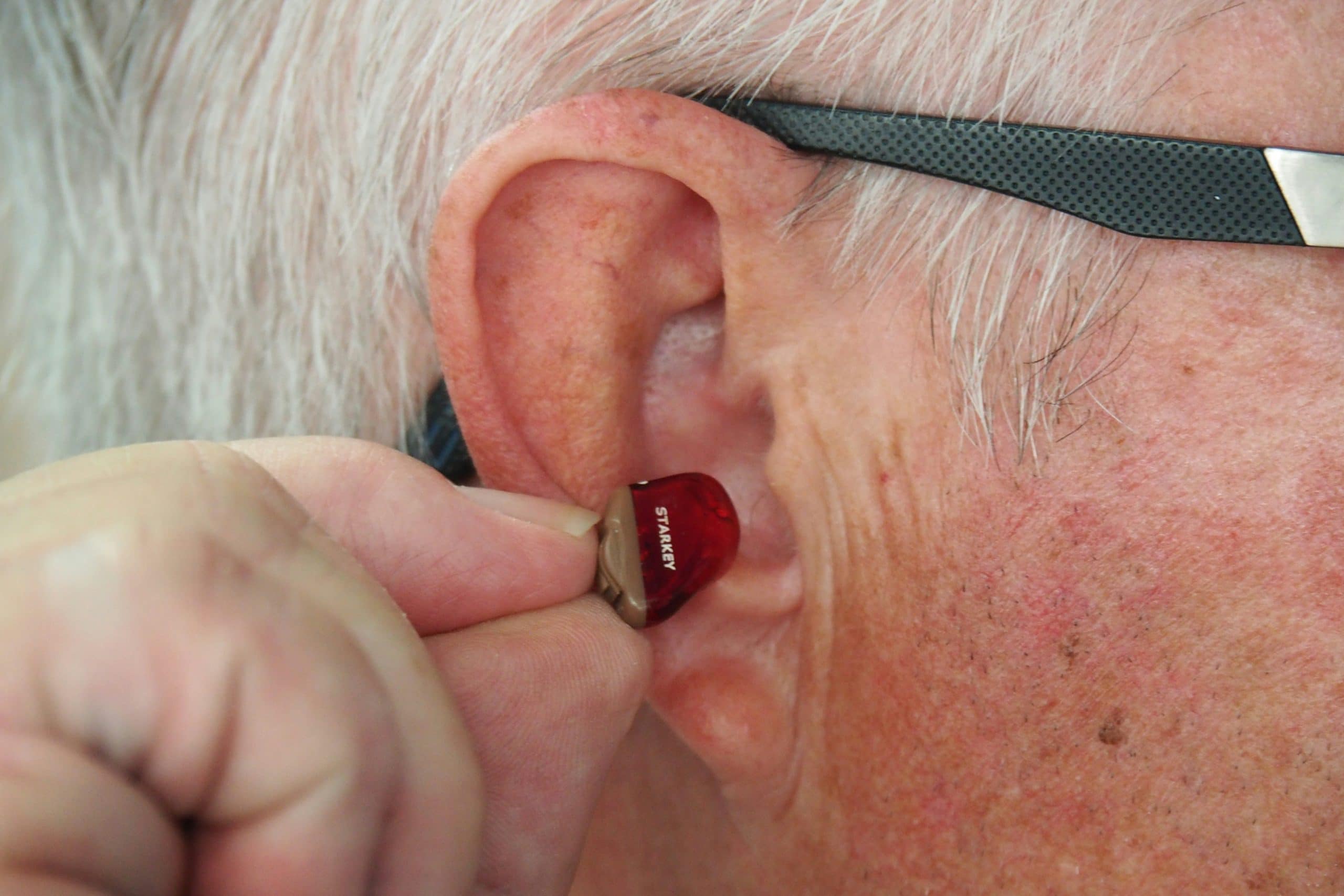
Selecting hearing aids can seem daunting with the many available varieties. But once you have found a device that suits you, it can truly transform your auditory experience and quality of life.
Whether you are exploring hearing aids for the first time or looking to upgrade your current set, this guide will equip you with the knowledge needed to make an informed decision, ensuring you walk away knowing how to select hearing aids that will not only improve your hearing but also complement your daily activities.
Firstly, What Are Hearing Aids? And How Do Hearing Aids Work?
A hearing aid is a compact, sophisticated electronic tool designed to amplify sounds. It works by capturing sounds from the environment using a microphone, amplifying those sounds with an internal amplifier, and then delivering the louder sounds directly into the user’s ear through a speaker.
With the help of hearing aids, individuals can converse clearly and enjoy life fully without the burdens and disadvantages of hearing difficulties.
Know the Different Types of Hearing Aids
- Receiver In The Canal (RIC): This type features a speaker located inside the ear canal, connected to a tiny hearing aid behind the ear by an almost invisible wire. It is an excellent choice for anyone seeking discretion and comfort and is suitable for all types of hearing loss.
- Completely Inside The Canal (CIC): For those prioritising invisibility, CIC hearing aids are nearly undetectable, nestled deep within the ear canal. They’re best for mild to moderate hearing loss, offering minimal wind noise and enhanced directional hearing without the visibility of traditional models.
- Inside The Canal (ITC): ITC hearing aids strike a balance between comfort and discreteness, fitting snugly within the ear canal. They are easy to insert and remove, making them ideal for active individuals with mild to moderate hearing loss who don’t want to compromise on comfort or subtlety.
- Inside The Ear (ITE): ITE hearing aids are housed entirely within the outer ear, providing ease of use and a secure fit. Suitable for a broader range of hearing loss from mild to moderately severe, these aids are for those who value comfort and easy handling.
- Behind The Ear (BTE): BTE hearing aids are the traditional type that rest behind the ear, connecting to an earmold in the ear canal via a tube. This design is versatile, catering to all degrees of hearing loss and preferred by many for its reliability and efficacy.
Technological Features You Will Find in Hearing Aids
- Bluetooth Compatibility: Modern types of hearing aids nowadays come with Bluetooth technology, allowing users to wirelessly connect their devices to smartphones, smartwatches, and more. This feature not only improves the signal-to-noise ratio for clearer sound quality but also eliminates annoying whistling feedback sounds.
- Artificial Intelligence (AI): The incorporation of AI in premium hearing aids is nothing short of revolutionary. Through deep neural networks (DNN), these smart devices can process sound in a way that closely mimics natural hearing. By learning from the user’s preferences and the acoustic environment, they automatically adjust settings for an optimised listening experience, truly personalising how you hear the world around you.
- Smartphone App Integration: Some hearing aids come with apps that offer users control over their devices. These apps enhance ease-of-use, from adjusting volume and settings to receiving direct sound streaming from phone calls and media. Moreover, some hearing aid brands such as Starkey offer speech-to-text and language translations to make communication even more effortless.
- Rechargeable Batteries: The shift towards rechargeable batteries in hearing aids marks a significant advancement in user convenience. Compared to frequently changing tiny batteries in the past, nowadays, users can enjoy a day of hearing aid usage on a single charge.
- Tinnitus Masking: For those with tinnitus, certain hearing aids offer a reprieve with built-in tinnitus masking features. These devices can alleviate tinnitus discomfort by generating a counter-sound, providing users with much-needed relief.
- Waterproof Design: Embracing the outdoors and active lifestyles becomes worry-free with waterproof hearing aids. Certain Starkey hearing aids, for instance, are verified to withstand water up to one metre deep, offering protection against sweat and rain. Though not intended for swimming, this feature ensures that your hearing aids are able to withstand heavy sweat and even rain.
- Health Tracking: Some hearing aids come with health tracking and listening engagement tracking functions. These can measure physical activities for overall wellness monitoring, and also assess the wearer’s participation in social interactions and environments to promote healthier hearing habits. Health tracking in particular may be a good feature to have if you are looking for hearing aids for the elderly.
How to Select Hearing Aids That Fit Your Lifestyle
- Evaluate Your Hearing Loss: The initial and most critical step is to thoroughly understand the nature of your hearing loss. A comprehensive hearing test is essential to pinpoint the severity and type of your hearing loss, which will significantly influence your choice of hearing aids.
- Ear Physicality: The unique physical characteristics of your ear play a significant role in choosing your hearing aids. The size and shape of your ear canal differ from person to person, affecting the fit and type of hearing aid. While many individuals can comfortably use in-ear models, others might require behind-the-ear devices due to their ear’s physical attributes.
- Technological Needs: Your daily surroundings and activities should dictate the desired technology level of your hearing aids. Advanced features like directional microphones and noise reduction are beneficial for those frequently in dynamic sound environments, whereas simpler technology might suffice for more stationary lifestyles. For example, when choosing hearing aids for the elderly, you may want to check if they prefer more basic features for daily use.
- Lifestyle Considerations: Your level of physical activity and the nature of outdoor engagements also dictate the choice of hearing aid. For those leading an active life, especially involving water or dusty conditions, selecting a durable, moisture-resistant hearing aid is crucial. Waterproof models are particularly advantageous for swimmers and outdoor sports enthusiasts.
- Aesthetic Preferences: Comfort and aesthetics are additional important considerations since the hearing aid will become a part of your daily wear. Modern hearing aids offer a range of styles from nearly invisible to those that match your skin tone, ensuring you can choose a device that aligns with your personal style and comfort levels.
About Hearing Aid Fitting and Maintenance
The comfort and effectiveness of your hearing aids depend significantly on their fit. Ideally, your hearing aids should nestle comfortably and securely in your ear, offering a snug fit without causing any discomfort or pressure.
Having a trial period is essential for testing your new hearing aids in various real-life scenarios to ascertain their fit and performance. Given that the shape of your ear canal can influence the fit, you might require several hearing aid fittings to fine-tune their comfort and functionality. This fitting process ensures that your hearing aids don’t just improve your hearing but also remains comfortable to wear throughout the day.
Hearing aid maintenance is just as crucial as finding the perfect fit in ensuring hearing aid longevity and optimal performance. Regular cleaning and proper care can prevent temporary malfunctions and extend the life of your devices. Dust, earwax, and moisture are common factors that can impair functionality, leading to issues such as distorted sound or reduced volume. By adhering to a maintenance routine – such as daily cleaning, storing them in a dry place, and using a dehumidifier daily – you can safeguard against these issues.
Choose the Right Type of Hearing Aids for Yourself or Your Family
Are you new to choosing hearing aids or helping a senior at home find a better hearing device? Our audiologists, hearing care consultants and staff can help you evaluate the situation, and advise on which hearing aids would suit you or your dependent. Contact us today or book a hearing test now.

 Find Us
Find Us Call Us
Call Us
